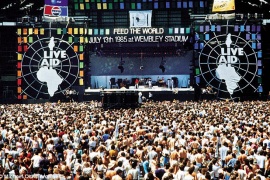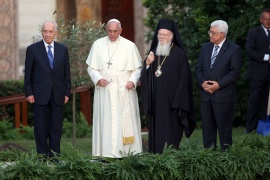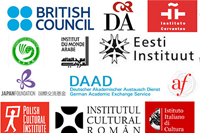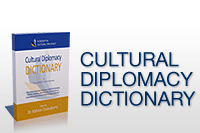|
|
| Line 95: |
Line 95: |
| | | style="width: 100%; padding:5px; border:1px solid #ddd; background-color: #f9f9f9; text-align:justify; font-weight:normal; font-size:65%; vertical-align:top; "|“The Cultural Diplomacy Dictionary is aimed at introducing governmental & diplomatic officials, academics & scholars, young professionals & students, artists, [[Civil Society|civil society]] & private sector representatives, to contemporary and evolving concepts of cultural diplomacy.” The Cultural Diplomacy Dictionary items have been gathered from a diverse range of literature, including English, American, French, Spanish, Chinese and German. The essential idea was to compile a list of terms that do not already possess a precise definition, and describe them in a way that is more relevant to global politics today. | | | style="width: 100%; padding:5px; border:1px solid #ddd; background-color: #f9f9f9; text-align:justify; font-weight:normal; font-size:65%; vertical-align:top; "|“The Cultural Diplomacy Dictionary is aimed at introducing governmental & diplomatic officials, academics & scholars, young professionals & students, artists, [[Civil Society|civil society]] & private sector representatives, to contemporary and evolving concepts of cultural diplomacy.” The Cultural Diplomacy Dictionary items have been gathered from a diverse range of literature, including English, American, French, Spanish, Chinese and German. The essential idea was to compile a list of terms that do not already possess a precise definition, and describe them in a way that is more relevant to global politics today. |
| | This Cultural Diplomacy Dictionary also contains references to influential people and organizations that have made significant contributions to cultural diplomacy and related fields, including Cultural Studies, International Relations, Sociology and Anthropology.[http://www.i-c-d.de/index.php/Category:The_Cultural_Diplomacy_Dictionary More...] | | This Cultural Diplomacy Dictionary also contains references to influential people and organizations that have made significant contributions to cultural diplomacy and related fields, including Cultural Studies, International Relations, Sociology and Anthropology.[http://www.i-c-d.de/index.php/Category:The_Cultural_Diplomacy_Dictionary More...] |
| − | |}
| |
| − |
| |
| − | {| style="margin-top:12px;color:black; border:1px solid #ddd; font-size:155%; background-color: #E0EBFF; padding:2px; border:1px; text-align:center; font-weight:bold;" width="95%"
| |
| − | | colspan="4" |
| |
| − | [[:Category:Research on Cultural Diplomacy|Research on Cultural Diplomacy]]
| |
| − | |-
| |
| − | |[[File:Ppwork1.jpg|200px]]
| |
| − | | style="width: 100%; padding:5px; border:1px solid #ddd; background-color: #f9f9f9; text-align:justify; font-weight:normal; font-size:65%; vertical-align:top; "|
| |
| − | Research on Cultural Diplomacy is an academic resource which offers a diverse and extensive range of examples of Cultural Diplomacy. Its primary function is to increase the access to and further the development of the field. As the field continues to grow, further research undertaken on the role and potential of Cultural Diplomacy consequently develops. Research on Cultural Diplomacy, therefore, focuses on expanding the current understanding of Cultural Diplomacy, as well as the methods for which Cultural Diplomacy can be successfully implemented.[http://www.i-c-d.de/index.php/Category:Research on Cultural Diplomacy More...]
| |
| | |} | | |} |










